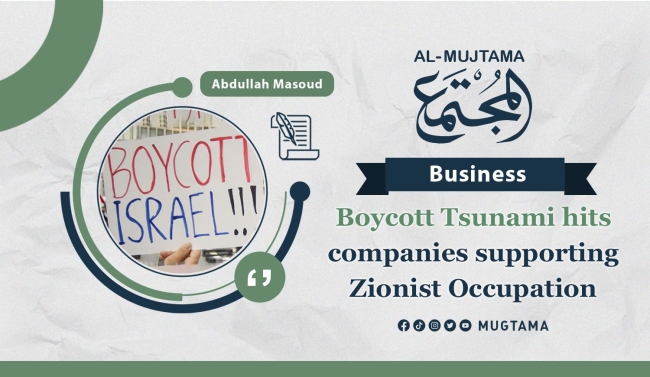Boycott Tsunami hits companies supporting Zionist Occupation Featured
With the continued intense “Israeli” bombing on the Gaza Strip and the massacring of thousands, including women and children, following the launch of the “Al-Aqsa Flood” operation, calls and popular campaigns in the Arab and Islamic world have escalated to boycott products from global companies supporting the Zionist entity.
Boycotting products from “Israeli,” American, and other companies supporting “Israel” has been one of the means of popular pressure used by Arab people to support the Palestinian cause for years.
Since the launch of the “Al-Aqsa Flood” operation on October 7 and the subsequent brutal “Israeli” bombardment on the Gaza Strip, calls for boycotts have gained momentum and achieved significant popularity in many countries around the world, especially in Arab nations.
Boycott campaigns included popular and union efforts to express support for the Palestinian people. Accompanying these campaigns were swift movements and appeals through social media platforms, making them achieve unprecedented popularity.
The decline in stocks of PepsiCo, Coca-Cola, and McDonald'sTop of Form
However, amidst this popular enthusiasm for boycotting products as one of the limited means available to people to support their brethren in Palestine, some raise questions about the effectiveness of this boycott. They question whether it is a successful means to truly retaliate against the enemy, especially considering that some global companies targeted by boycott calls, such as “McDonald's,” “PepsiCo,” “Coca-Cola,” and “Starbucks,” witnessed a decline in their stock prices for some time.
Top of Form
Production cycle
In response to these questions, the economic analyst Hamdi Al-Jamal stated that no one, whether an expert in economics or not, can definitively say that the sales of foreign companies have decreased or that they have incurred losses.
He explained that it is necessary to go through a production cycle of no less than 3 months, possibly up to 6 months, to assess the situation through a statistical analysis comparing sales before the war on Gaza and after 3 months of its occurrence.
A “CNN” economic report mentioned that the stocks of some companies included in boycott calls, such as “PepsiCo,” “Coca-Cola,” and “McDonald's,” experienced declines at times coinciding with the ongoing war in Gaza.
Decrease in Sales
Top of Form
On the other hand, the economic expert Hani Abu Al-Fatouh considered that calls for boycotting companies supporting “Israel” created a wide echo in Egypt and Saudi Arabia, prompting a large number of companies to deny any connection to “Israel,” thereby increasing the effectiveness of global public opinion.
Production cycle of at least 3 months to reveal the extent of losses
Abu Al-Fatouh mentioned that there is some evidence of the effectiveness of boycotting products of global companies supporting “Israel,” including a decline in sales of some international companies in Arab and Islamic countries after the launch of boycott campaigns against them.
He provided examples of some companies that were affected by the boycott campaigns, such as “Adidas” in Saudi Arabia, which saw a 20% decline in sales there after a boycott campaign due to its support for “Israel.” He also noted that “Nestle” announced a halt to its investments in “Israeli” settlements after a boycott campaign against it.
He explained that several factors impact the effectiveness of boycotting products of global companies supporting “Israel,” including the level of consumer participation in the boycott. The more consumers participate, the more effective it becomes. Additionally, the impact of the boycott on public opinion matters; the more it influences public opinion, the more effective it becomes.
Parent company
However, the economic expert and president of the Egyptian Forum for Economic Studies, Rashad Abdou, believes that the boycott steps could affect national investors and do not serve the interests of local economies, which will suffer as a result of these campaigns.
He stated that it is necessary to differentiate between whether the company is a foreign branch or a national investment obtaining commercial franchise rights from the parent company. He considers that the repercussions of the boycott impact local companies holding franchise rights rather than the targeted parent companies.
Responding to Abdou's statements, economic analyst Layan Al-Salehi said that boycott campaigns undoubtedly affect the parent companies, which benefit monthly or annually from the profits and sales of local companies across various countries and regions worldwide. She clarified that the impact on local companies from boycotting their products and any disruption in their profits also affects the parent company.
“Israeli” economy losses exceeded $30 billion
The Jordanian analyst revealed that the boycott campaigns have other goals beyond causing material and economic losses to these companies. According to her, these goals include conveying the voices and opinions of the people to these companies regarding what is happening to the Palestinians.
Economic Repercussions
Hossam Mahmoud, one of the founders of the boycott campaign in Egypt, stated that the “Israeli” economy is currently experiencing one of its most significant crises. This is compounded by preliminary loss indicators exceeding $30 billion in the ongoing war.
Mahmoud explained that the economic repercussions of the war will become more apparent in about two months, and its effect will be obvious on the “Israelis,” especially due to the enlistment of reserve soldiers at unprecedented rates.
Mahmoud believes that this situation will make the “Israeli” economy more fragile than ever, emphasizing the call for communities to boycott. He affirmed that any step towards boycotting products supporting “Israel” would have a direct or indirect impact on the “Israeli” economy.
Regarding the choice of companies to boycott, he stated that our position is clear: boycott any company that supports the violations of the “Israeli” occupation and apartheid practices in the occupied Palestinian territories.
In this context, the “Boycott, Divestment, and Sanctions” movement (BDS), a global Palestinian movement, stated that consumer boycotts have compelled many businesses worldwide to refrain from selling specific “Israeli” products. The movement emphasized that all “Israeli” companies are, in one way or another, involved in the “Israeli” occupation and its apartheid system.
-------------


